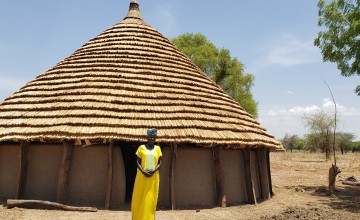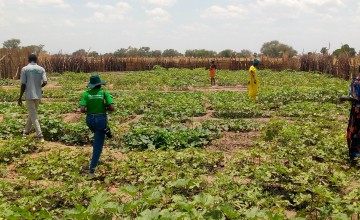
Read our 2023 annual report

Knowledge Hub
Village Saving and Loans Associations increasing flood resilience in South Sudan
Village Saving and Loans Associations increasing flood resilience in South Sudan
Conflict, displacement and climate shocks are some of the reasons that food and nutrition insecurity increased in Northern Bahr el Ghazal State since 2011, leaving communities vulnerable and increasing household dependency on humanitarian aid. Concern Worldwide, through the Zurich Flood Resilience Alliance, is focused on finding practical ways to support communities to strengthen their flood resilience in Aweil West and Aweil North countries of Northern Bahr el Ghazal State through local actions such as Village Saving and Loans Associations.
Building flood resilience through Village Saving and Loans Associations
Through the Flood Resilience Measurement for Communities tool, Concern Worldwide South Sudan have identified and implemented various action plans, such as the Village Savings and Loans Associations (VSLA) technique, to mitigate the negative impact of floods in their communities.
With support from the Alliance, 29 VSLA groups have been formed across the 13 communities in which Concern works. The VSLA’s empower the communities, especially women, to diversify incomes by offering loans to create and develop small businesses. In turn, the VSLA’s also allow local communities to grow economically and become resilient to flooding by responding faster using financial power gained.
Concern provided the groups with trainings on VSLA methodologies, with a focus on record keeping and business management skills. This training was complimented with kits comprising of savings boxes and stationery for record keeping purposes. Presently, the groups meet once per week to discuss progress on savings, loans and shares. Members can acquire shares at 500 South Sudanese pounds (SSP); however, a member is only currently allowed up to 5 shares per sitting.

Community member Abuk Wieu participated in the VSLA Scheme and was able to use loans from the group’s savings to construct a flood resilient grass thatched house, traditionally called a ‘Luak’, for keeping her animals in. “As a community action group member, I learned a lot on building flood resilience in my household and in my community. I was able to save 500 SSP on a weekly basis and later started saving 1,000 SSP after completing construction of my house’’ said Abuk.
Abuk keeps a variety of domestic animals, including goats, sheep and lactating cattle. The group loaned Abuk 18,000 SSP at an agreed interest rate of 20%. She used the money to purchase local materials, such as poles, and paid for the transportation of the building materials. She said that a group of women supported her in thatching the house and she cooked meals for them, which cost her 3000 SSP. “I used the knowledge on flood resilience to first raise the floor of my ‘Luak’ to keep the animals safe from flood water. I have also started raising the ground around my homestead” she explained.
The community also initiated a disaster fund through household contributions. 54 households contributed about 3.5kgs of sorghum and three households contributed 3000SSP (1000 SSP per household). The action group said that they are going to sell the sorghum and keep the money in their disaster fund.
Life-changing impact
Makuach Kotic is a community in Aweil North County that can be completely cut off for up to four months of the year by flooding during the rainy season. Through funding support from the Alliance, members from the 12 bomas (administrative units consisting of multiple villages within a hierarchical structure), formed their own community action plans, which have helped mitigate the negative effects caused by the recurrent floods.
We started dyke construction on our own as a flood protection measure though it has been put on hold due to firmness of the ground as we are in the peak of dry season. The 34 VSLA groups established across 12 bomas are making a great impact in terms of access to finances as the groups continue to save. Apart from generating income, women are no longer buying vegetables in other markets as they can produce vegetables at this time of the season for first time in this community. I have observed a change in children’s health because of (the) different diet, they benefitted from the diversified vegetable options. Because of these various benefits, my community members began to appreciate this project, including those who claimed it is a waste of time in the past as it was not offering any tangible solutions to their immediate problems.
To further prepare communities for the rainy season, awareness raising sessions were conducted in May 2023, during which, information relating to marked higher grounds identified, river crossing points and routes was communicated to the communities. A second set of sessions were also conducted for 2 days targeting community, women, youth and church leaders, health and education personnel on Water, Sanitation and Hygiene (WASH), safe water handling and evacuation routes/areas with the aim of cascading information to the wider communities.
The community – through the support of community action groups – identified, designated, and communicated three locations which have higher grounds within the community that can be safe havens for evacuation during flooding. Most households have begun to raise the floors of their houses and the entire homestead as a flood protection measure.
As well as from awareness-raising and sensitisation sessions, 143 community action group members (38 female, 105 male) were trained on First Aid in March 2023 for 2 days, through group discussion, presentations, and practical demonstration. Basic training equipped the community action group to be able to response rapidly to emergencies including cardiac arrest, choking, bleeding, fractures, burns, poisoning, and drowning, which are quite common during periods of flooding.
The Alliance support was crucial to trigger community-based disaster risk management and it has successfully changed the communities’ mindset towards building resilience and self-sufficiency. The project gains helped Concern to consider community resilience as integral element in its advocacy plan for South Sudan. Concern will continue to leverage from the learnings and the work done under the Alliance and will continue to advocate with donors and other stakeholders to sustain the gains made under the project.
To learn more on Concern Worldwide’s work in South Sudan, read our country brief.


